Tony Kotnik, Ro Lewis, Morgan Minter and Sarah Panter - Tremco’s Dedication to National Safety Stand-down - PODCAST TRANSCRIPTION
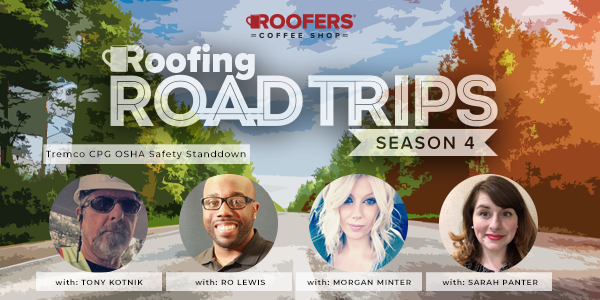
Editor's note: The following is the transcript of a live interview with Ro Lewis, Tony Kotnik, Morgan Minter and Sarah Panter from Tremco of WTI You can read the interview below or listen to the podcast.
Speaker 1:
Welcome to Roofing Road Trips with Heidi. Explore the roofing industry through the eyes of a long-term professional within the trade. Listen for insights, interviews, and exciting news in the roofing industry today.
Heidi Ellsworth:
Hello, welcome to another Roofing Road Trips from Roofers Coffee Shop. My name is Heidi Ellsworth and I am road tripping cross-country to the headquarters of Tremco and WTI. You all know Tremco. We're going to go across country and talk to them about what they're doing with service and maintenance, the amount of taking care of buildings across the country, Canada and internationally. Working with Tremco over the last couple years, I have been so inspired by their commitment to safety.
Heidi Ellsworth:
Safety is their culture. They just lead with safety all the time. You've seen this on Roofers Coffee Shop, and today we really wanted to meet the people behind this. The team that is really making it happen. I'm here today with the Tremco Construction Products Group field safety team, led by Ro Lewis, joined by Tony Kotnik, Morgan Minter, and Sarah Panter. Welcome, everybody to the show.
Ro Lewis:
Hey, thank you.
Sarah Panter:
Hi, Heidi.
Tony Kotnik:
Happy to be here.
Heidi Ellsworth:
I am happy to have all of you. I have to tell you, I've been really excited about this podcast, because there's nothing more important in our industry than safety and you all are leading the way.
Heidi Ellsworth:
What I'd really love, is if we could start out and we'll have you all introduce yourselves. Talk a little bit about what you're doing with Tremco and the CPG Group, and just the company overall a little bit, if you want. Ro, let's start with you.
Ro Lewis:
Okay. Thanks, Heidi. I'm Ro Lewis. I head up the safety team for field services here, as the director of health and safety. And when we say field services, I am happy to say that is global now. It is no longer just the states. We are supporting the entire breadth of the field and all of the folks that support field services.
Ro Lewis:
So we're a team of 11 and that will be non-field experts as it relates to safety, which comprises maybe about, I would say Tony would probably argue with this, with 300 plus years of safety, knowledge, and experience and expertise. I'm proud to be a part of this team.
Heidi Ellsworth:
That is great. Thank you. This is global. That is a big deal. We're going to talk more about that during this podcast. Sarah, would you mind introducing yourself?
Sarah Panter:
I'm Sarah Panter. I've been with Tremco about three years. This is my first experience with the roofing, building, maintenance industry, however, I've been in the construction industry in different administrative roles since about 2006.
Sarah Panter:
I, and my partner, Olivia, we're the admins and we take care of everything for our group, as far as anything administratively and also support any technology needs.
Heidi Ellsworth:
That's great. That's great. Thank you. Morgan, can you introduce yourself?
Morgan Minter:
Yeah. I'm Morgan Minter and I am the field safety manager for the entire Canadian region, so all of Canada coast to coast. This is a fairly new initiative through Canada, so we really just tried to unify our efforts from what we had in the US, and now we've taken it across Canada.
Morgan Minter:
I have been working with Tremco for almost three years now, in health and safety for almost 12. It's been a really great experience. And like you said, it's a great organization, and I learn a lot from them every day, and it's been a great experience.
Heidi Ellsworth:
Wow. Very cool. Very cool. Tony, bring us home.
Tony Kotnik:
All right. Tony Kotnik, I'm the assistant director. My background actually started out in product development. I have been with Tremco pretty much all my life. When Ro was talking about the timetable, I'm not adding up any years of experience. It's no longer fun. But as we go through, you'll find out that is an integral part of some of what we do.
Tony Kotnik:
That experience and the fact that there's folks that have spent their entire life and have brought their family in with them, multiple generations. Within the team, a lot of the things I get involved in, figuring out the procedural or tactical aspects of what we do. A lot of the time, what I do is I get inspired and hopefully turn that around, and inspire the other members of the team as well.
Ro Lewis:
Got that right.
Heidi Ellsworth:
Yeah. Tony, I really love that. That takes us into our first question that I had. I just really wanted to understand there's so much conversation around the culture of a company. How is the safety plan, how have you seen that really impacting the employees of CPG overall, everywhere?
Tony Kotnik:
Well, from my point of view, and I wrote down some notes just to keep on track, but our performance does speak for itself. We do track metrics and our metrics are continually improving, and they're very good. For example, our EMR, that's one of the gold-plated standards, and we've steadily driven that down to what we feel is an industry leading number around 0.6 now. When we operate, that's not how we talk in our operations.
Tony Kotnik:
But when somebody says, "How do you determine whether you're effective or not?" That is part of it. When we start talking about the culture, and I'll let everybody else weigh in on this. The culture is that folks understand why we do what we're doing, why we talk about safety, why we have the vision of leading with safety, and what that's about. And as we go further, we'll talk about nuts and bolts.
Tony Kotnik:
But what that really means is people understand that we're here to help them, to protect them, to care for them. Not so that we have some numbers, or so that we can get some contracts, or so that we can stay of trouble with you-know-who, that kind of thing. It is clearly our purpose is felt by the people that we serve.
Heidi Ellsworth:
Yeah, I see that all the time. Ro, you've really been leading this team for a number of years. You and I have talked before and we've gone through a lot of things. So how have you seen such an ongoing, consistent push on safety really change the culture of the company?
Ro Lewis:
Well, I think Tony, it's a great segue into what I was going to say because the crux of our culture is we value people, we do. All of our efforts are made with people in mind, whether it be solving problems for them or empowering them, which is huge, most importantly, protecting them. I think it has been beneficial for our company because they feel that. There's a saying that says what goes from the heart goes to the heart.
Ro Lewis:
I really believe that the folks that work for us and work with us, that we partner with and support, they know that we're out for them. Even in some of those moments where we have to gently correct them, they know it's born out of love, and born out of we want them to go home safely to their families. There's nothing more important than that in our organization.
Ro Lewis:
We have the motto: Lead with Safety, but shortly after that we came behind it and said, "Lead with safety so we could end with family."
Heidi Ellsworth:
Nice.
Ro Lewis:
We know how valuable each of us are to our families. And our aim on a daily basis, is to never have to go to a wife, a son, a daughter and say, "Your mom, your dad, your husband won't be home today." It has really undergirded the business practice and the actual integration. What's important to me and what's actually just makes me excited every day, is I have seen over the years, safety now become fundamentally ingrained into every aspect of our business.
Ro Lewis:
Years ago, the leadership, and I have to talk about them as well. They understood that as we grew, we were moving into a more unstructured environment. They understood that we were dealing with more dangerous scenarios. They coined from that moment on that safety was going to be the cornerstone of our business. We just didn't know what that looked like and now we are experiencing what that looks like. It's just growing and I love it.
Heidi Ellsworth:
I love that. I love that when you can really see, that it just becomes fundamental. They don't even have to think, they just do. Morgan, with going into Canada, I talked to some of your teammates last part of last year.
Heidi Ellsworth:
They're talking about how they're growing the business out of Canada and what's all happening up there. So you're bringing all this, I wouldn't say to a new market, but to a developing market. How's that working?
Morgan Minter:
Well, so far, so good. It really was unchartered water for a lot of the folks here. It's been really amazing to be able to sit back and watch how things have grown into what they are today. When we talk about the culture and what Tony and Ro are saying, it really is true. Even where we maybe didn't have everything developed here, we still had a lot of that mentality. We really are for a large company, we really do have that small family type feel. It really does help when we are bringing all of this in here, there really is that personal touch.
Morgan Minter:
And people really, they care and they want to make sure that everything is done safely. I won't say that there hasn't been a lot of bumps along the way, but we take it all with a grain of salt, and we work through it, and I think that we're moving forward. I think that we will get to where we want to be. It's growing faster than I think we thought it would. I think that's a good thing, and I'm really proud to be a part of what they're doing here. I think it's nothing short of amazing really, when you see where it was even three years ago to what it is now.
Heidi Ellsworth:
Yeah.
Morgan Minter:
Yeah. It's pretty amazing. You have those days where you feel overwhelmed, and it seems like there's a lot going on, and sometimes it can feel overwhelming. But then if you look back, and you look at how much has happened in such a short period of time, and how much change and how much people have really adapted, really it's quite amazing how well everyone has handled it and has welcomed.
Morgan Minter:
But like I said, it is family. There's generations here and they want to take care of the family, and they want to make sure everyone is safe. As long as we're giving them the tools and the resources to do so, they will do it and they will welcome it. Yeah, it's been pretty amazing.
Heidi Ellsworth:
That is so true.
Ro Lewis:
You know, Heidi?
Heidi Ellsworth:
Yes, Ro.
Ro Lewis:
It's funny because we don't get a chance to really talk about that very much with Morgan. Like she said, she's been here three years, but we were very intentional with the family piece. That's just who we are. For her to be able to feel that even across the border, has been something that we are real.... Because if she can feel it, then she's able to have it become universal throughout the region.
Ro Lewis:
We've been very intentional with our universality and I'm sure we'll talk about that later. But it makes me feel good to hear her say that she feels a part of the family, even across the border. And sometimes the intangible are the things we need to look at and if she can feel it, then I feel good about that.
Heidi Ellsworth:
Well, and so much has gone on and to be able to have that foundation, even with all this craziness that's going on between COVID, and material shortage, everything else, that really is what speaks to it, that foundation. I loved how you said that.
Heidi Ellsworth:
I think Sarah, as you're looking at that overall coordination, working with everybody, bringing a supporting role, what are you hearing from other employees about the safety initiatives, and how it's changed and how important it is?
Sarah Panter:
When Morgan was speaking, one thing I thought about was our folks consistently want to do the right thing. They know it's not about someone watching. It's who we are and that's who they are too, which is so awesome. When I talk to the field coming in to the organization is, "Well, safety's everywhere. You guys are doing everything and it's great." We've got a lot of different programs that we're doing. Just this year we've started incentivizing near misses and Stop Work Authorities, which I think it's not about the money.
Sarah Panter:
It's about the recognition. You stopped, you did the right thing for yourself and your coworkers. I think that the field sees that, knows that. I know that other folks, they know they can call any of us. They know if they call me, I may not have the answer, but I know which one on the team would be best suited to answer the question or concern. Tony's coined it, you get one of us, you get all of us. That's not a bad thing. It's great. And with Morgan and Andrew, they definitely bring, as part of our international piece, they bring just such different legislation requirements.
Sarah Panter:
They're showing us best-in-class, as far as what their requirements are. Then we know what's best-in-class for the US and to merge those into really just an internationally best-in-class program is really exciting.
Heidi Ellsworth:
That's exactly where I was going to go, because I was curious on after hearing from Morgan and thinking about, "Okay, Canada has its own set of OSHA." I know it's probably not OSHA maybe there, but we'll talk about that.
Heidi Ellsworth:
So before we get to that, Ro, paint the picture of what you're doing internationally, because it's hard enough just to deal with the US, but then when you're internationally in all the different laws, how's that working?
Ro Lewis:
It happened organically, as a part of our growth perspectives and just adding value to every aspect of our business, as it relates to safety. And looking at the UK, as well as Canada, they're so similar as we learn about the legislation. And have the experts like Morgan and then we mentioned Andrew Hiscock, who joined our team recently. It is really interesting to see that safety essentially is the same across all borders. Ultimately, we are dealing with some of the same rules and regulations, but we are not a company that focuses on the rule and regulation that much.
Ro Lewis:
As a matter of fact, in some instances, we go above and beyond that bare minimum to protect our people. And so as I mentioned before, universality has been the focus. When you get one of us, you get all of us. That means we all have to be operating from, I call it, the same Bible. We're working from the same rule book or playbook. We're helping all of our people to not only understand the importance of why we do what we do and who we are, but it is important for them to see for themselves and their families, why it's as such.
Ro Lewis:
I think if there was a difficult pain point that I could identify with going across the border, is creating that universal standard. But with having the experts on the team that we have, it really hasn't been as much of an issue. As Morgan says, it's going much better than she would've anticipated. I'm just happy to see that across the borders.
Heidi Ellsworth:
Love it. Morgan, what is the official title of the safety regulated, our OSHA is what in Canada?
Morgan Minter:
It's different in every province.
Heidi Ellsworth:
Oh, okay.
Morgan Minter:
Yeah. So actually, we don't have one governing body like the US does. We have a different one in every province, so we are provincially regulated. And unless you are a federally regulated company, then there's a federal regulations.
Morgan Minter:
For every province that we work in, we have a different regulation that we need to follow for that province. It gets even trickier, depending on the province that you're working in. So you have to know the regulations for each and every province. It can be tricky sometimes.
Heidi Ellsworth:
It seems so smart to me what Ro is saying, that when you look at that, even state to state in the United States, we know that there's different rules and regulations. So if you have this universal expectations that are higher than all of the combined, it makes it put it together. Tony, what have you seen with that, as you go out to the employees and the team just of bringing that universal expectation?
Tony Kotnik:
Yeah. What you really look at is the underlying principle, of course, is the laws of physics. So if you fall off a roof in Canada, it's going to be pretty much the same story, as if you fall off the roof in the US or in the UK. And so many of the things that you have to do to protect yourself are going to be the same, because they're going to be offering the same type of solutions, same types of practices. We want to get real good at those.
Tony Kotnik:
We want to learn from everybody's different points of view, because there's some things you can do in the US that you can't do in Canada, or you can't do in the UK. Sometimes that helps us out when we learn, "Wow, they don't have that in the UK, but they manage to get their roofing done anyway." So now we can go back to the United States and say, "Well, you know what? Maybe you don't need to have this other practice. Let's get really good at the other ones."
Tony Kotnik:
That'll be better for us, for our protection, our business, our expertise, and so forth. So lots of cool learning across the borders and again, we all start thinking it's way different because of those regulatory languages that we run across. But then when we boil it down, the end in mind is exactly the same. And once we work at that or we point to that, we come up with the best solution.
Heidi Ellsworth:
Yeah. I love that. Sarah, you're supporting all of this. You and your team are supporting all of this internationally. Sorry, I just think it's cool. I have to ask, has that been fun to be able to start working with folks in the United Kingdom, Canada obviously, and bringing all this together?
Sarah Panter:
Definitely. It's been a unique opportunity. When I interviewed with Ro and Tony, they were like, "We're going international." And then next thing I look up, we're international. I was like, "Oh, wow." Yeah, I enjoy working with Andrew and Morgan. It's the time changes has been the biggest change. It's like Andrew, you can set something end of day. You wake up the next morning it's done.
Sarah Panter:
I've had all day to work on it. It's using those things to your advantage that have been fun. Also, just learning the different ways they use technology. We are getting new opportunities. We brought in some wearables, which we haven't really experimented with yet. We were able to start that out in the UK. I'm excited to see how that's going to come over to the US and improve our programs here.
Heidi Ellsworth:
I've been seeing a lot of those wearables, and that was going to be my next question too, talking about technology and what all you are using. The type of technologies that are really helping your program. Ro, maybe you could feed off that.
Ro Lewis:
Yeah. So we are a systems-based group of folk. We operate in an organized fashion, based on our systems. As a matter of fact, the whole premise of introducing safety everywhere would probably sink us if we didn't have the systems and the platforms that we have. But the one thing that I really like about what's happening with our organization, I know you heard Tony talk about roofing. I know this is Roofers Coffee Shop, but we're diversifying our business so much. We're moving into so many different areas of the construction genre, that we need all of these systems to help keep our segmented pieces of business, but still introduce the overall corporate objective.
Ro Lewis:
One of our biggest partners that we have that helps us tremendously on a day in, day out basis is a company called SafetyCulture. They are out of Australia but I tell you, that does not matter because they are absolutely phenomenal. Every team across the world actually, we have interfaced with them. And what they basically provide us is a system called iAuditor. And iAuditor is our web-based mobile platform that we implement in a lot of different ways, various ways in the organization. That we simply started with just safety and producing safety audits and things of that nature.
Ro Lewis:
But now, it's moved into a business model where they are using it in the organization for production even. It's just been a great partnership with them to help us to be able to create, we call it a daily task analysis. The motto is a DTA every day. Every one of our workers have to engage in this daily task analysis. And as you may already know, we may have crews that hit three or four different job sites in a day. Well, it doesn't matter. Each job that you go to, you're responsible for vetting the project right then and there, real time to ensure that we not only negotiate hazards, but we also have to think about the unforeseen things that may come into play in an unstructured environment.
Ro Lewis:
So the daily auditing, the truck auditing, the job site inspections that are comprehensive, they've now moved into quality. Maureen is huge into that now, to quality and looking at the production aspect of it, and helping even our inspections team, so that's one process. We have our learning management system that we brought on. We've coined it I lead. I lead represents to learn, to empower, to advance and develop. I lead is a huge part of Tremco that helps us not only push out our training regimen, but it also helps us to manage our incident and our whole incident notification process.
Ro Lewis:
I could probably just go on and on about all the platforms, but it's a comprehensive system that Sarah and administrative team really helps us tremendously to keep it organized.
Heidi Ellsworth:
That is so cool. I love it. I've seen the iAuditor and what you all are doing across the board. That really takes you to this ability to really showcase safety overall. I want to talk a little bit about National Safety Stand-Down, and I know you've been all nine years, you're a platinum sponsor.
Heidi Ellsworth:
You are a leader in this. So Tony, let's start with you. Maybe, can you talk a little bit about your involvement over the last nine years with Safety Stand-Down?
Tony Kotnik:
Yeah. The most important thing is that we stand up actually more than stand down. We just stop and take a moment to recognize that we are in a dangerous business. We work at height. Falls are, of all the hazards that we face in the workplace, that's by far and away the worst of the worst, in terms of what could happen. The severity of the consequences and in the frequency to which we're exposed. It gets both sides of that risk calculation.
Tony Kotnik:
And then because we're there every day, it tends to make us be a little bit blind to it, complacent. We get used to it. And so if nothing else, we are just saying that we're going to take a few minutes times a lot of people. There are some people that did look at it from that point of view when we started out. But we're going to take a few minutes, and we're just going to do some basic symbolic stop and recognize it.
Tony Kotnik:
And then, of course, the practical side of it is we do some hands-on demonstrations, or if you want to call them trainings, toolbox talks. But with the idea of making it highly visible and interactive to the point that it brings value, or is important to the people that are participating. This is what they're doing.
Heidi Ellsworth:
This is the US, OSHA. Morgan, is there something similar or does Canada do the Safety Stand-Down? Or do you just do it with all your folks up there, along with that week that's going to happen on May 2nd through the 6th?
Morgan Minter:
Well, this is actually Canada's first year participating in it.
Ro Lewis:
Yes, sir.
Morgan Minter:
Yeah. We're super excited to have some of our folks participate. It was just one of those things that just geographically was a little bit more difficult, just how spread out we are and whatnot, and as we are doing program rollout and everything here in Canada. But three years in now, and everyone's super engaged, and they're really excited to be part of it this year. I'm really excited to see our folks out there, and actively engaging and being part of it. We don't really have an equivalent to it here in Canada.
Morgan Minter:
We have what we call National Day of Mourning, which is where we recognize workplace injuries and fatalities. We recognize that on April 28th, which is this week obviously. But we don't have that where we stand up and just really talk about safety as more a positive part of it, as opposed to that negative side of it. I'm really excited to see our folks participating in it this year and they're excited to be part of it. So just another way that we're unifying with those groups, and breaking those borders down, and everyone working together so it's really exciting.
Heidi Ellsworth:
It's really cool.
Ro Lewis:
Can I just piggyback on Morgan's statement? This is a true showing of what we articulated earlier, that we are not really focused as much, we thank OSHA, and CPWR and NIOSH for bringing this together and driving this effort every single year. What we've done, is we've actually seized this opportunity and I got to tell you, I'm so excited about it this year in particular, because we are taking it to Canada. We are taking it to the UK. We are taking it to nonconventional the diverse aspect of our businesses, as a part of Tremco CPG.
Ro Lewis:
And though OSHA is coining it the stand down for fall protection, and it has its place in some of our businesses, but we are going beyond that and just making it a safety day for our entire organization or a safety week for our organization. It's an exciting time in Tremco, as it relates to everybody taking a moment and really discussing what impacts their safety program the most.
Heidi Ellsworth:
Well, what are some of the actual events you're going to have during that week for your Tremco employees? What are some of the things? Maybe give us a highlight of the week?
Ro Lewis:
Well, you want to talk about herding cats. We have a group of about 1,400 plus employees all over the place and that's growing every day. We've not only ordered T-shirts and paraphernalia for folk, and we're sending it across the globe to people to all converge on this whole experience. We're doing stand downs, and lunches, and lunch and learns in every one of our regions. Every one of the provinces are going to deal with different safety topics.
Ro Lewis:
We're distributing safety information concerning fall protection via a multiplicity of vehicles, both text and emails. We're getting on stand down calls. And what we've typically done in the company, we've had a centralized effort. We're now decentralizing those efforts to every region, and letting them be creative. And then bring back to us all the pictures and all the fun that they're having surrounding this.
Ro Lewis:
We have people, and let's just say the Gulf Coast region, for instance, that's a large expands and we have three different groups that are going to be converging in three different locations just in that region alone. Yeah, we're just doing a ton stuff.
Heidi Ellsworth:
Wow. Yeah. I love it. I love how you bring everybody together. I'm assuming there's going to be a lot of Zoom also going on?
Ro Lewis:
A lot of Teams calls.
Heidi Ellsworth:
A lot of virtual. Yeah, Teams calls.
Ro Lewis:
Yeah.
Heidi Ellsworth:
Sarah, I have a feeling you've been very active getting ready for this.
Sarah Panter:
Yes. Olivia and I have clocked many hours and much, much, much to do to get all this going in the background. We are so excited. This is going to be so great to have a community event coming out of the pandemic, to really get together at some point during the week. However, the groups choose to do it, to really take a minute and talk about safety in that positive light. It's great.
Heidi Ellsworth:
I love it. I love it. Well, Ro, I would love for you to as I said earlier, bring us home but wrap up with just if you're giving advice out to other companies out there, other construction groups, whether it's roofing, it doesn't matter, anything.
Heidi Ellsworth:
What is some of your advice on just looking back at where you started, where you're at today, of how to really make this that foundation, that part of any company out there? What's some of your advice?
Ro Lewis:
First, I would say you've got to love people. You've got to love the folks that you're working with. When I say love, I'm talking about you really have to have in your core, that they are the most valuable asset to a business. Without them, we have no business and that leads everything else. The second piece is it's great to have all of these systems that we've talked about and have all this exciting stuff going on, but I have to give a shout out to our leadership team in our organization.
Ro Lewis:
If it not for Paul Hoogenboom, and Mardee Billingsley, and JK Milliken, and those leaders that not only because that's hard in a culture. It's hard to present all this stuff, and then people are constantly looking at bottom lines and not really seeing the value that safety actually adds to an organization. I got to say, I don't care which company it is or what part of construction or manufacturing you're in, if you don't have a leadership team that supports your efforts, then you're really just struggling on a day-to-day basis.
Heidi Ellsworth:
Yeah.
Ro Lewis:
So value people, have your leadership involved, and do the very level best you can to make them a part of every aspect of what you're doing. And then continue to remain sustained with all of your forward-thinking and constantly look for ways to get better. Never have the mindset that we've arrived.
Heidi Ellsworth:
Yeah.
Ro Lewis:
Never.
Heidi Ellsworth:
Yeah, because it changes every day.
Ro Lewis:
Changes every day.
Heidi Ellsworth:
If COVID has taught us nothing, it's taught us that. Everything changes constantly and it's all about the health of everybody who we work with. I love that. Going home to the family, that's the bottom line right there.
Ro Lewis:
Absolutely.
Heidi Ellsworth:
Well, I just want to say thank you to all of you. This has just been excellent. We got to do this again because there's a ton of topics that we haven't even covered, but you are all going to have a phenomenal week, May 2nd through the 6th. And everyone out there who's watching, you can see.
Heidi Ellsworth:
We will be showcasing what Tremco, the Construction Product Groups of Tremco, what they're doing that week. We'll be sharing pictures. They'll be on the directory, it'll be in articles because you all are really the leaders. And we want everyone to be able to watch what you're doing, and be able to bring it into their companies.
Ro Lewis:
But if I could just say thank you, and thank Roofers Coffee Shop. You have been a great partner over the years for Tremco in many aspects. But the fact that you take time to look at every component of the business and highlight it as you do, it's just phenomenal and we appreciate you having us on.
Heidi Ellsworth:
Well, there's a lot to highlight so it makes it fun all the time. It's really good. Thank you. Thank you all, Morgan, Tony, Sarah, and of course, Ro, thank you for being here today.
Ro Lewis:
All righty. Appreciate it.
Tony Kotnik:
Thank you, Heidi.
Sarah Panter:
Thank you.
Heidi Ellsworth:
Thank you all for listening. This is the kind of information that we want to bring every week on Roofing Road Trips. You can find all this information, of course, on Roofers Coffee Shop in the Tremco and the WTI directories. We constantly are putting articles out. They have videos. It's amazing all the information, including our most recent lunch and learn, which talks about what's happening up in Canada.
Heidi Ellsworth:
So be sure to check it all out and be sure to on your favorite podcast channel, to subscribe and get those notifications because you don't want to miss a single one of these podcasts. Thank you so much for being here and we'll see you next time on Roofing Road Trips.
Speaker 1:
Make sure to subscribe to our channel and leave a review. Thanks for listening. This has been Roofing Road Trips with Heidi from the rooferscoffeeshop.com.

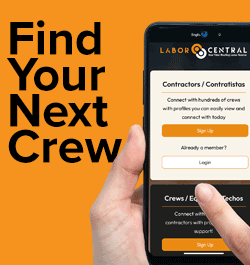
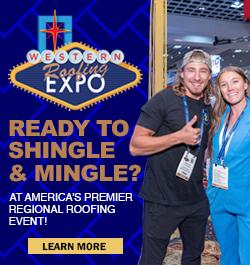


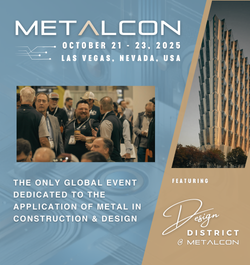







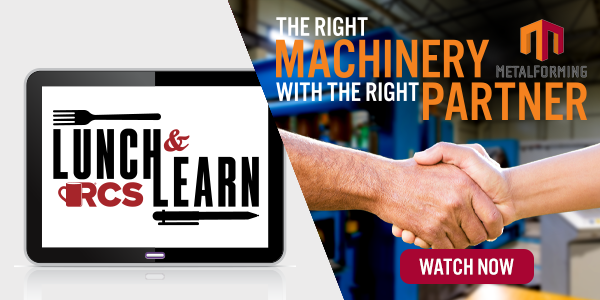
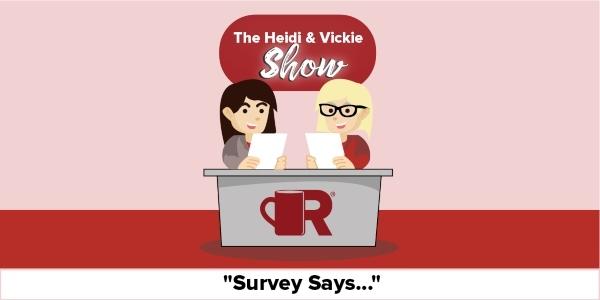
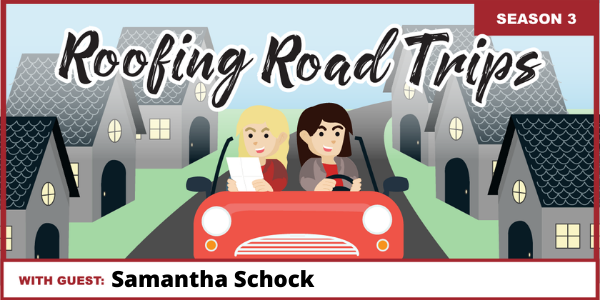
-2.png)

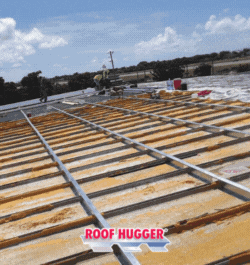
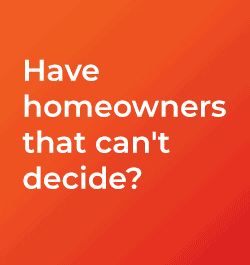
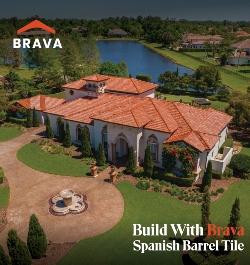
Comments
Leave a Reply
Have an account? Login to leave a comment!
Sign In